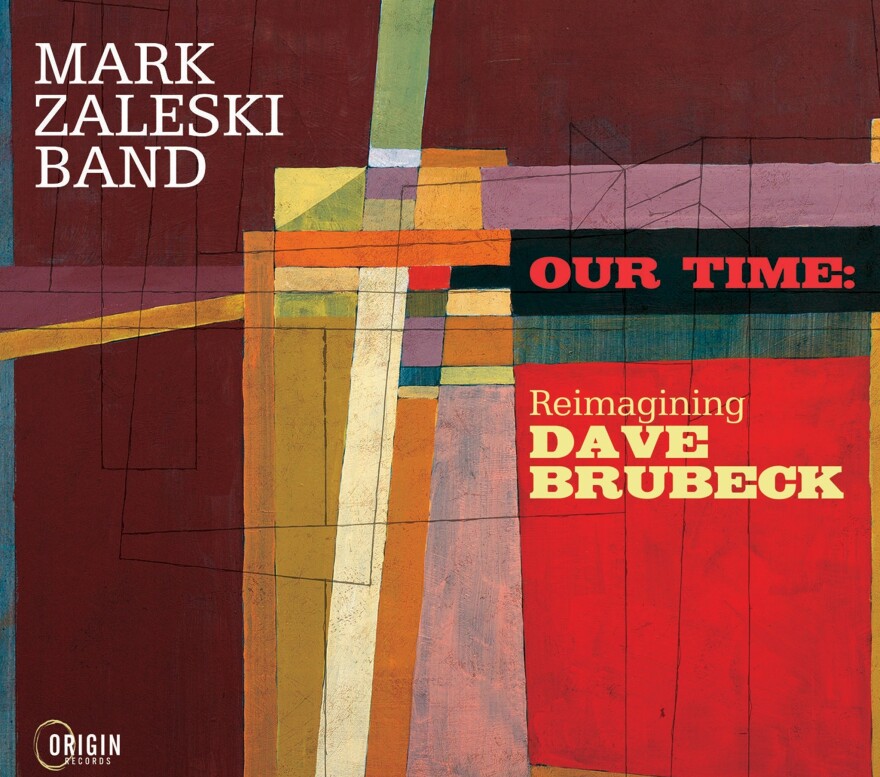If there’s one thing that all the great jazz masters agree on, it’s that mimicry is not jazz, at least not good jazz. Maybe it’s part of the developmental process, but it’s the antithesis of what you strive to present to an audience.
Saxophonist Mark Zaleski learned this almost as soon as he began studying at the Dave Brubeck Institute in California in the early 2000s. In the liner notes of his latest release, Our Time: Reimagining Dave Brubeck, his third as leader of the Mark Zaleski Band, Zaleski recalls one of his first opportunities to actually play with the great man himself. It was a date at the Library of Congress; Christian McBride was on the gig, joining Brubeck, Zaleski, and a band of Zaleski’s Brubeck Institute classmates.
During rehearsal, the students launched into Brubeck’s “In Your Own Sweet Way,” producing a perfect facsimile of the version from Brubeck’s album. The maestro was most displeased.
“He insisted that if we were going to play his music, it’s imperative that we find our own voice,” recalls Zaleski in the liners. “Only now, 16 years after I finished my time at the Brubeck Institute, I think I’m truly ready to take on that challenge.”
After 16 years of letting Brubeck’s lessons marinate, Zaleski presents us with something worth savoring here, proving once again that low-and-slow wins the day in both preparing good barbecue and developing one’s own musical identity.
As a musical meal, Our Time is a plate that will strike the palate as both familiar and not. The generous sides of Brubeck served up are choice, if lesser known, cuts, while the piquant seasoning is entirely Zaleski’s.
It’s the jazz record equivalent of a slice of grilled spam between layers of sushi rice (a popular on-the-go snack in Hawaii): Exotic yet homey. Clever and ironic—even daring in some ways— but not obnoxiously proud of itself. Just the right amount of ego. It’s a delicate balance to strike, and no tune strikes it better than the opener, “Blue Rondo a la Turk.”
Out of all the Brubeck tunes Zaleski revisits here, this is really the only one he could’ve led-off with. Instantly recognizable yet glamorous, alluring, and as non-standard as standards get, “Blue Rondo’s” a perfect microcosm for Zaleski’s approach to the material.
Zaleski hews close to home at first; he wants you to know what you’re listening to. But with each restatement, the monumental theme is adorned with a new element. First, it’s drummer Oscar Suchanek, who, with just a few well-placed clicks of his snare’s rim and intuitive use of the hi-hat, juxtaposes a contemporary rhythmic sensibility against the Turkish motif. Then, the next time through, tenor saxophonist Jon Bean and guitarist Mark Cocheo join Zaleski in playing the Desmond line in three-part harmony. Not overly engineered, but dynamic. The sax players jump between unison and harmony before announcing in that heraldic fashion the 12-bar blues section where Desmond and Brubeck traditionally trade measures. This is where Zaleski shepherds us into his land of make believe, eschewing Desmond’s land of dry martinis and communicating a comparatively astringent alto sound full of restlessness and urgency and maybe even a little fury.
A languid, almost plaintive, take on “The Duke,” Brubeck’s 1955 paean to Ellington, follows. It’s a long drag of a cigarette that’s already been smoked down the quick, but the warmth of a piano solo courtesy of Zaleski’s brother Glenn, another Brubeck Institute alum, brings us back into the sun’s warm embrace, even if the shadows of desperate late afternoons are closing in quickly behind.
The prettiest, most lyrical selection here is “Softly, William, Softly.” Not surprising, as the original recording, from Brubeck’s Time In (1966), is among the most emotionally moving pieces in the entire Brubeck songbook. The opening here, featuring just the saxophonists, with Zaleski opting for his soprano, is a perfect amendment, somehow lending the arrangement a feeling of heightened spirituality. From there, it evolves into a turnkey companion for any compelling piece of film noir. The arrangement and accompanying solos, especially Bean’s on tenor, possess the necessary narrative subtext.
For another one where Bean and a soprano-wielding Zaleski carry the melodic day, see the penultimate track, “The Golden Horn.” Originally from 1958’s Jazz Impressions of Eurasia, this is one of the Brubeck canon’s most underrated tracks, and Zaleski and co. carry it off in a manner that’s beyond competent and on the road toward thrilling. Bassist Danny Weller’s fast walking lines make it all possible; he’s truly the anchor here.
You’ll love how guest vocalist Michael Mayo’s delivers lyrics originally written for Louis Armstrong on “They Say I Look Like God,” and, if you’re one for sentimentality and tradition, you’ll appreciate that Zaleski and his brother play “Fujiyama” straight because they’ve been playing it that way since elementary school and didn’t want to mess with something so sacred.
But compare that with how they treat “Unsquare Dance,” the most radically made over tune here. The iconic handclaps and 7/4 time signature remain, but that’s about it. Where Brubeck’s merged jazz with a country-western motif, Zaleski’s is more of a strut, with an electric guitar solo from Cocheo giving off both jam-bandy and southern gothic flavors and a melding of the horns that brings to mind the best of Jeff Coffin with Bela Fleck and the Flecktones.
If, as a Brubeck fan, all that sounds discomfiting to you, recall the old master’s advice cited above. Zaleski has, and I suspect Brubeck would find Our Time a fine execution of the lessons he sought to impart.


